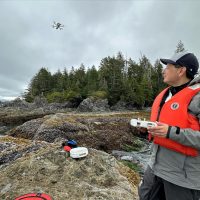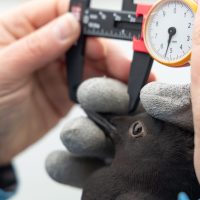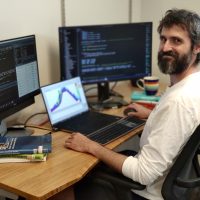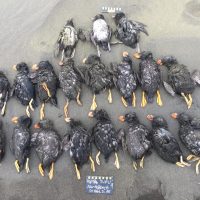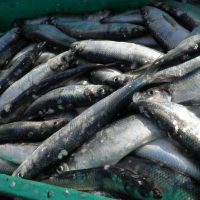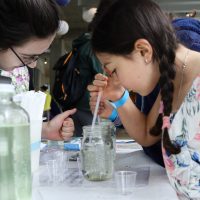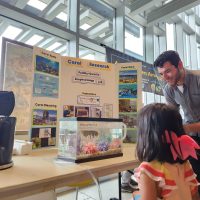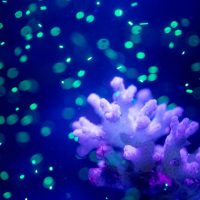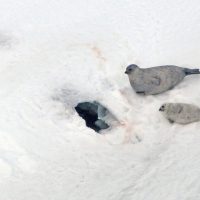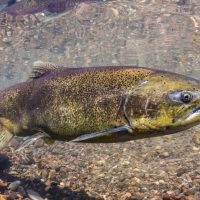Filter Results
Enhancing diversity, conducting drone research: welcome to Corey Garza
Welcoming the newest SAFS Professor and Associate Dean for Diversity, Equity and Inclusion for the College of the Environment, we spoke with Corey Garza. He shares his plans to enhance College diversity, what he’s most excited about by joining SAFS, and insight into his world of research using drones.
What plans do you have for Diversity, Equity and Inclusion (DEI) as Associate Dean?
“Someday I’ll fly away”: monitoring hatchling to fledgling timescales on Protection Island
Nesting season on Protection Island is a busy time for SAFS Masters student, Liam Pendleton. Home to tens of thousands of pigeon guillemots and rhinoceros auklets, Liam travels to Protection Island in the Strait of Juan de Fuca every week from May to September to conduct research and monitoring of these seabirds.
Working in the Quantitative Conservation Lab, led by Sarah Converse, Liam is studying the link between breeding success, and marine environmental conditions.
Ecosystem modeling of the Gulf of Alaska for fisheries management
In a post-doc focused on modeling climate change effects in the Gulf of Alaska (GOA), Alberto Rovellini is part of the Punt Lab at SAFS. Beginning in 2020, Alberto’s work is on this area of Alaska which is facing big implications as a result of climate change, from negative economic implications for important fisheries to adverse ecological impacts on plankton, fish, mammals, and seabirds.
Read moreMarine heat waves caused mass seabird die-offs, beach surveys show
New research led by the University of Washington uses data collected by coastal residents along beaches from central California to Alaska to understand how seabirds have fared in recent decades. The paper, published July 6 in the journal Marine Ecology Progress Series, shows that persistent marine heat waves lead to massive seabird die-offs months later.
Read moreFirst Nationwide Assessment of Non-Federally Managed Fisheries in the U.S.
A new study produced by The Nature Conservancy (TNC) and the University of Washington (UW), with the lead researcher from SAFS, provides the first-ever nationwide assessment of non-federally managed fisheries in the United States.
Read moreBringing science to life at the UW Aquatic Sciences Open House
Another year, another fantastic day of bringing science to life at the UW Aquatic Sciences Open House. Featuring 30 booths, each with an interactive activity dedicated to specific research underway in the world of water, this year’s Open House welcomed more than 600 visitors.
Making aquatic science accessible to all is one of the driving forces behind the Open House. The event is hosted by the School of Aquatic and Fishery Sciences, which sits on the south campus of the University of Washington and just across from Portage Bay.
Read moreSEAS Open House featured on FOX 13 Seattle news
The UW Aquatic Sciences Open House was featured in a 2-minute segment on FOX 13 Seattle, showcasing the breadth of research and highlighting the importance of Open House events for accessibility and inspiring a new generation of scientists.
Read moreJacqueline Padilla-Gamiño’s research on microplastics in marine ecosystems featured by UW News
Tiny pieces of plastic in the ocean might seem innocuous on their own, but their growing presence is a frustrating issue facing marine ecosystems. The particles’ small size makes them difficult to clean up, and it also allows them to easily burrow into marine environments or even get ingested by ocean organisms.
Read moreOn the ice and from the air: Combining Indigenous Knowledge and multidisciplinary science to investigate Alaska’s ringed seals
In the Arctic, where temperatures are rising at nearly four times the global average, a collaborative effort, combining Indigenous Knowledge with multidisciplinary science has been used to investigate the denning habitat selection of Alaska’s ringed seals.
During the Ikaaġvik Sikukun (Iñupiaq for “Ice Bridges”) project, researchers from the University of Washington School of Aquatic and Fishery Sciences (SAFS), Lamont-Doherty Earth Observatory of Columbia University, University of Alaska Fairbanks, the Native Village of Kotzebue, NOAA, and Farthest North Films collaborated with an Elder Advisory Council of Iñupiaq Qikiqtaġruŋmiut Elders with extensive personal history of subsistence hunting and experience on sea ice.
SAFS Professor joins Radio Tacoma’s Climate Talks
As part of the Climate Talk series by Radio Tacoma, Dr. Mark Scheuerell from SAFS joined to speak about PNW salmon populations and what they tell us about the state of our environment. Click the link and scroll down to listen to the episode.
Read more